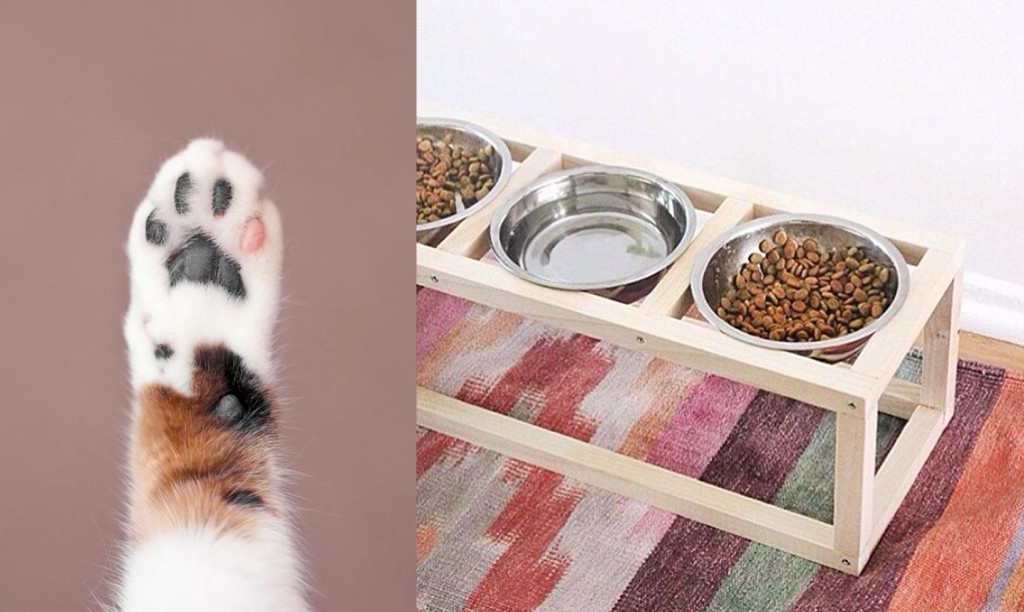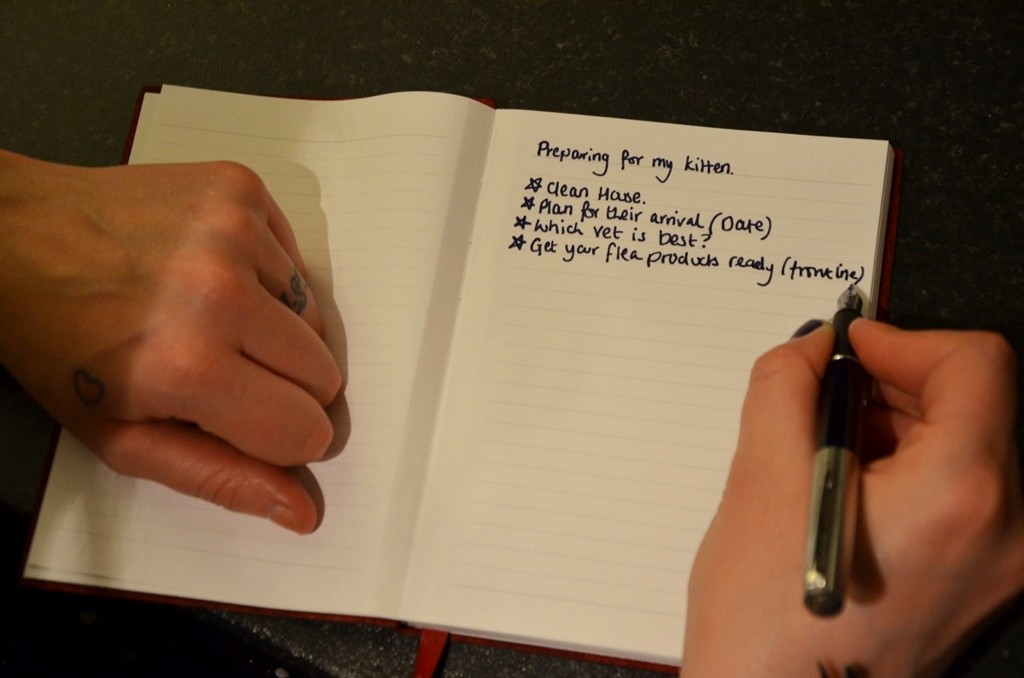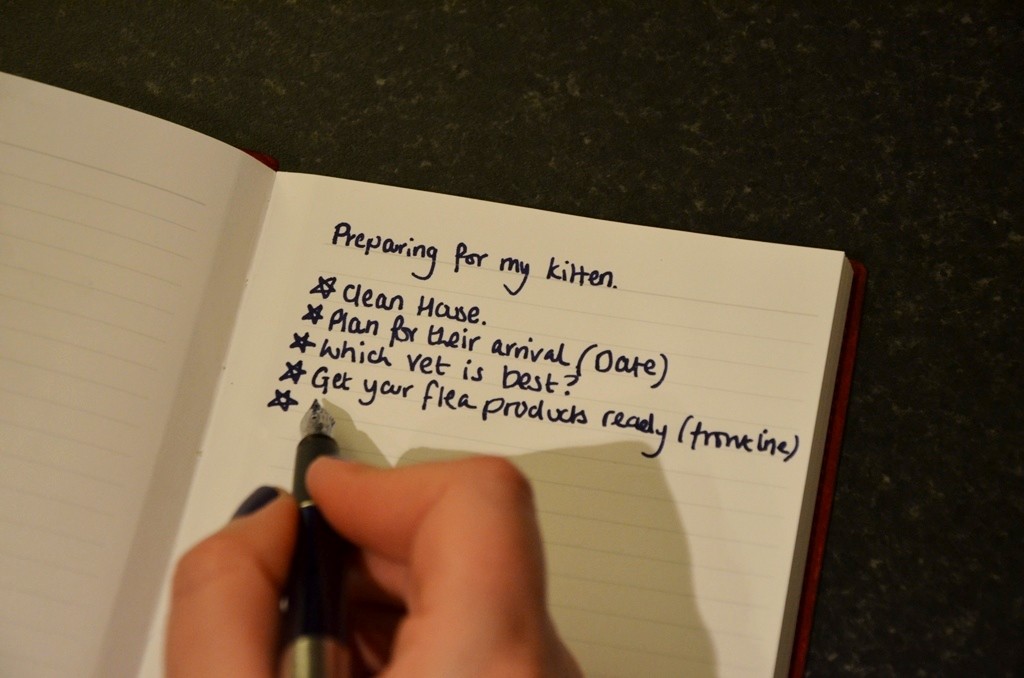
I’m starting to get excited as Gary and me have just bought our first home together! After years of renting, paying for our wedding and saving, we have finally signed our contacts and have moved in and just before Christmas too! As the property market is just nuts in London and the south east, we wanted to get on the ladder as soon as possible as it seems to be proving impossible for many people now but we are just so relieved to have our little terrace house in Brentwood.
As well the excitement of this new chapter, we are also really happy as we are going to get ourselves a KITTEN! It’s been ages since I owned a cat and with Gary fully onboard, I can’t wait to find our furry little friend and bring them home.
But before we do that, I really want to make sure our new house is ready for our new pet. Most places where you can buy animals will worm, microchip and give them the right vaccinations but it’s always best to get them checked out by a vet and also look at introducing FRONTLINE® Spot On into their routine.
FRONTLINE® Spot On have some great videos for pet care including this video below which gives you tips on how to keep your home clean which is going to be an ideal video for me to watch to prepare for our new arrival.
[wpdevart_youtube]0N8rNOL7m2I[/wpdevart_youtube]
To help anyone else who is planning on introducing a new kitten into their home, Simone Pomerantz from FRONTLINE Spot On has answered some of my very important questions:
How do you make your home safe in preparation for a new kitten?
If you have not had a kitten in the house before (or it is a long time since you last had one) then it is a good idea to do a check of the house to highlight areas of danger. There are things which are poisonous to cats; there are products which will burn paws or skin; there are situations to avoid. Remove poisonous plants and substances and make sure there are no small items such as needles and thread left lying around.
How should you prepare for your kitten to be safe if you will be having a Christmas tree/Christmas decorations?
A kitten is going to be naturally inquisitive when a tree comes into the house so before you decorate the tree have it in the house for a few days for the kitten to investigate. Let the novelty wear off without risking of any smashed baubles and put the tree away from anywhere the kitten can jump up on to it. The pine needles on a real Christmas tree are toxic to your pets and may give them stomach upsets. They may also get stuck in their paws so be sure to check them regularly. Keep your tree well watered to prevent needles from falling off and vacuum regularly too. When decorating your tree, keep the bottom of the tree relatively empty with no low hanging ornaments and stick with shatterproof ornaments just in case! Tinsel is an absolute no go as it’s very enticing for kittens but very dangerous for them if it is ingested.
 Where should your new kitten sleep/how do you settle them?
Where should your new kitten sleep/how do you settle them?
Purchase a cosy bed for your kitten, there are lots to choose from. Your kitten will probably end up preferring your bed! Also consider purchasing, hiring or borrowing a kitten pen. You can use one of the cages people use for dogs in the back of a car or purpose made kitten or puppy pens which are roughly 1m x 0.75m x 0.75m. Inside there is room for a bed and a litter tray and to put food and water. You can put them in the pen when you go out or at night so you can be sure that they are not getting themselves into trouble. The pen also gives them time out if you have dogs, other cats or children as kittens do need a lot of sleep. They feel safe inside and soon learn to snuggle up in their bed. It is also brilliant for making introductions to dogs, cats and children so the kitten is protected but other animals can get used to it.
When do you allow your kitten to go outside?
Because of potential infection from diseases, your kitten should not be allowed outside until at least a week after it has finished its first course of vaccinations at about 13 – 14 weeks old (depending on the vaccine). You could then let it explore outside with your supervision. Before you let it have free access outdoors, make sure you have had your kitten neutered (at around 4 months), that it is fully vaccinated, is micro-chipped and has become used to life in your house.
How can you prepare your home to keep your kitten warm in the cold winter months?
When temperatures get very low, it is advisable to bring cats indoors to sleep. Make sure that your kitten has a warm bed in an area that is free from draughts, and blankets to keep it warm. In the case of snow or very low temperatures, cats should be kept inside to keep them safe.
How should you prepare your kitten to go outside?
Before allowing your new kitten or cat outside, ensure it has a means of identification, either a securely fitted safety collar with a tag and ideally, a microchip. Once it is fully vaccinated and has become used to life in your house, you can start to let your kitten go outside a bit more. However before you allow your kitten free access outdoors, make sure it has been neutered. You should also ensure your garden is safe for your kitten by covering any ponds, blocking up any holes in the fencing and removing any potentially hazardous garden substances or objects, such as wood preservatives, insecticides, sharp implements etc.
If you are at home for large periods of the day you may wish to consider allowing access ‘on demand’ via the back door or a conveniently positioned window. However if you are out at work during the day you may prefer to install a cat flap. You may wish to confine your kitten or cat at twilight, so that it can remain indoors at night, or limit its access outside at times when traffic may be busy locally.
It’s useful to get your kitten or cat used to being called to come to you – you can do this by offering it little treats so that it’s happy to respond. You then have a little bit of control when you go outside to call them in.
Choose a dry day (if possible) and a quiet time when you can accompany your kitten outside, allowing it to explore the new environment. Continue to accompany your kitten until it is used to your garden and can find its way back to the house without difficulty. It is best not to leave your kitten outside alone until it is 6 months old and it is essential that it is neutered (from 4 months of age) before allowing it unsupervised access.
How important is treating your kitten for fleas and ticks?
Besides causing distress to your pet, flea infestations can transmit tapeworms (because part of the tapeworm lifecycle is spent inside fleas), as well as causing secondary bacterial infections due to scratching. Furthermore, severe flea infestations can lead to anaemia in kittens, while animals with flea allergy dermatitis can develop severe irritation and inflammation following exposure to even a small number of fleas. Ticks can cause irritation and infection at the site of attachment.
Importantly, ticks rank second only to mosquitoes in disease transmission to pets and people. This includes viruses, bacteria and protozoa. Fleas will happily bite humans, and in some cases these bites can cause allergic reactions.
Ticks will also attach to, and feed from people and can transmit diseases such as Lyme Disease. So, treating your kitten for fleas and ticks is really important for the health of your pet as well as the health of your family.
What things should you remember if you have a house full of people at Christmas?
Amid all the hustle and bustle of the season, don’t neglect your kitten waiting patiently for you to come home from Christmas festivities. As much as possible, try to keep your kitten’s normal routine. Keep up your daily playtime and cuddling sessions. When there are a lot of people in the house at Christmas, reserve a quiet room for your kitten, away from the crowd where it can stay away from the stress of the loud noises.
What should you be prepared for if you have other pets or children?
CHILDREN: A new kitten or cat needs a great deal of commitment particularly in the early stages so the whole family has to play a role, even if it is agreeing to participate in regular playtime. Parents should teach a child how to behave appropriately around a cat, how to approach, interact and handle them as well as how to read the signs when a cat has had enough and always respect their need for time alone. Before your new cat arrives you will need to register with your local veterinary practice. Cats and kittens need regular treatment for worms and fleas as these could be a potential health hazard for your family. Ensure that every member of the family understands the importance of keeping external doors and windows shut and make sure your kitten has plenty of escape opportunities indoors if it needs a break from the children.
DOGS: Introduce the dog to the kitten in a kittening pen or dog pen; this will make sure that no chasing occurs. Ensure your kitten has a place to hide within the pen. Make sure both animals are familiar with each other’s smells by stroking them. Allow the dog to sniff the cat through the cage and reward the dog for good behaviour. The first time they meet outside the cage make sure the dog is on a lead and cannot follow if the cat runs away and make sure the cat has lots of high places to escape to. Never leave the dog and cat alone together until you are happy that they are safe together
CAT: Arrange to collect your kitten on a day when you know you will have plenty of time to devote to settling it in. Purchase or hire a kitten pen and position it in a room that your existing cat doesn’t particularly favour, for example a spare bedroom. Stroking your cat and the kitten regularly and swapping bedding will enable the kitten’s smell to become familiar and incorporated into the communal, household scent. Make sure there is somewhere for the kitten to hide in the pen as your other cat explores around the pen. Existing routines should be maintained to demonstrate that the kitten represents no loss of resources or enjoyment. Once kitten and cat appear calm when in close proximity to each other (with the kitten inside and the resident cat outside the cage), move the pen to other rooms, leaving out those particularly favoured areas where the adult cat spends the majority of its time. Once they are comfortable with this, open the cage and let the cats get to know each other under close supervision. It may be advisable to separate the kitten and adult cat when supervision is not possible, at least until their relationship is firmly established. Both kitten and adult, in the long-term, should be provided with their own resources (bed, litter tray, food bowls, water bowls etc) positioned in separate locations and their own private areas where they can rest undisturbed by the other.
*Merial Parasiticides Multi Channel Share Report Q2 2015

If you are getting a pet soon, I hoped some of these Answers will help you as much as they are helping me out! As you can imagine, I really can’t wait to get my new little fur ball home and I promise I introduce them to you very soon!







One Response
Ahhh!! I’m planning to get a kitten this year. Looking forward to seeing what kitty you get. Do you know what kind you’ll get?